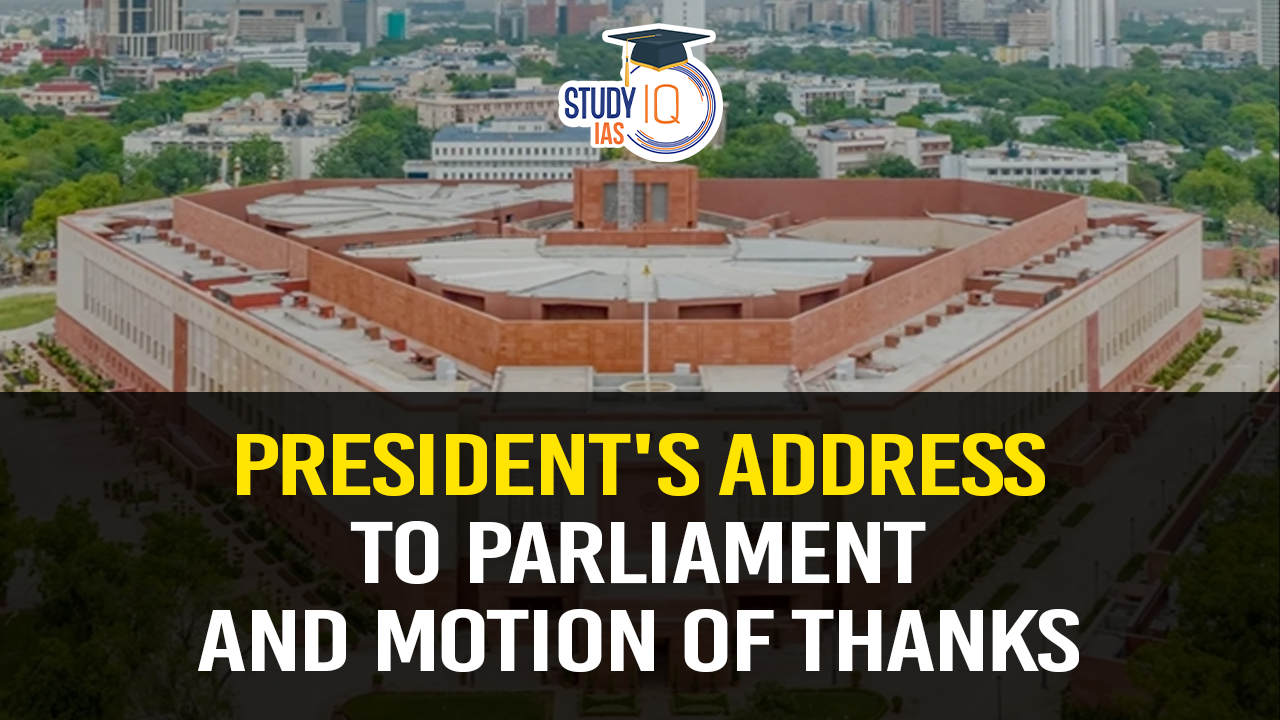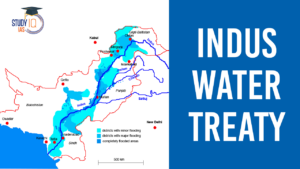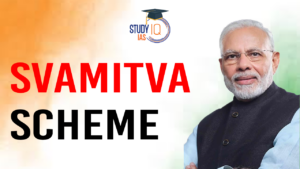Table of Contents
Context: President Droupadi Murmu addressed the parliament.
President’s Address to the Parliament: An Overview
- Article 87 of the Constitution: It provides two instances when the President specially addresses both Houses of Parliament.
- The President of India addresses both the Rajya Sabha and the Lok Sabha at the beginning of the first Session after each general election when the reconstituted lower house meets for the first time.
- The President also addresses both the houses at the beginning of the first session of each year.
- The President’s address, similar to Britain’s ‘speech from the Throne,’ is debated in both Houses of Parliament through a procedure known as the ‘Motion of Thanks.’
What is Motion Of Thanks?
- The Motion of Thanks is a formal procedure in parliament where a motion is proposed to express gratitude or appreciation for the President’s Address to both Houses of Parliament.
- The President’s Address, which outlines the government’s policy agenda, is prepared by the government itself.
- It reviews the government’s activities and achievements over the past year and outlines the policies, projects, and programs that the government intends to implement in relation to significant national and international matters.
- If amendments are proposed and approved, the Motion of Thanks is adopted with those changes.
- Amendments can address content within the Address itself or issues which, in a member’s view, the Address has overlooked.
- After the debate, the motion is presented for a vote.
- The debate typically concludes with a response from the Prime Minister or another Minister, followed by the disposal of any amendments and a final vote on the Motion of Thanks.
- The Motion of Thanks must be approved by the House; failure to pass it is considered a defeat for the government and can indicate a lack of confidence from the Lok Sabha.
- Restrictions on the Motion of Thanks include prohibitions against discussing matters not directly under the purview of the Central Government or mentioning the President’s name during the debate.
Key Highlights Of the President’s Address
Economy and Finance
- In 10 years, India has risen to being the fifth largest economy in the world from being the 11th largest. From 2021 to 2024, India has grown at an average rate of 8% annually.
- In April 2024, GST collection was over two lakh crore rupees for the first time.
Agriculture and Food Security
- A large network of Farmer Producer Organisations and co-operative organisations are being created.
- More than Rs 3.2 lakh crore has been disbursed to farmers under the PM-KISAN Samman Nidhi.
- The government has effected a record increase in MSP for Kharif crops.
Industry
- Investments are being channelled into emerging sectors such as semiconductors and defence manufacturing, with a Rs 27,000 crore semiconductor plant planned in Assam, aiming to make the northeastern region a hub for domestically produced chips.
- India has emerged as the third largest start-up ecosystem globally.
Infrastructure
- India is the world’s third-largest domestic aviation market.
- In the last 10 years, airline routes in India have increased from 209 to 605. This has directly benefited Tier-2 and Tier-3 cities.
Urban and Rural Development
- Expansion of PM SVANidhi to include street vendors in rural and semi-urban areas.
- Three crore houses were approved under PM Awas Yojana.
- Commitment to transforming cities into world-class living spaces.
Energy and Environment
- Over one crore families registered under PM Surya Ghar Muft Bijli Yojana, receive rooftop solar connections, contributing to zero electricity bills and potential income from selling electricity.
- Government support of up to Rs 78,000 per family for solar installations.
Health
- Free health services provided to 55 crore beneficiaries under Ayushman Bharat Yojana, including all seniors over 70.
- Rapid expansion of Jan Aushadhi Kendras, with 25,000 centres being opened.
Education and Sports
- Introduction of engineering studies in Indian languages.
- Major reforms in examination bodies and processes, including enactment of stricter laws against unfair means in examinations.
- Establishment of Nalanda University to position India as a Global Knowledge Hub.
- Initiatives like Atal Tinkering Labs, Start-up India, and Stand-up India enhancing youth capacity.
- Preparation by the Indian Olympic Association to host the 2036 Olympic Games.
Social Justice
- In the past decade, 25 crore Indians have moved out of poverty.
- PM JANMAN, allocated over Rs 24,000 crore, focuses on the development of backward tribal communities.
- PM SURAJ portal provides soft loans to enable livelihood opportunities for disadvantaged groups.
- PM Divyasha Kendras, offering affordable assistive devices to persons with disabilities, are expanding nationwide.
Women and Child Development
- Majority of the houses built under PM Awas Yojana have been allotted to women.
- Over the last decade, 10 crore women have joined self-help groups (SHGs); 30,000 received Krishi Sakhi Certificates.
- The campaign to make three crore women Lakhpati Didis is supported by increased financial assistance to SHGs and the NAMO Drone Didi Scheme, which includes training SHG members as drone pilots.
Defence
- Implementation of the Chief of Defence Staff role and reforms in ordnance factories (restructured into seven Defence Sector Enterprises) have strengthened defence forces.
- Defence manufacturing in India exceeds Rs one lakh crore, with about 70% of defence procurement sourced domestically last year, and cessation of imports for over 500 defence items.
- Defence exports have surged over 18 times to Rs 21,000 crore.
- Development of two defence corridors in Uttar Pradesh and Tamil Nadu is ongoing.
- Rs 1.2 lakh crore disbursed under the One Rank One Pension scheme.
Home Affairs
- The Bharatiya Nyaya Sanhita, set to enforce from July 1, 2024, along with three new criminal laws, aims to expedite the judicial process.
- Implementation of the Citizenship (Amendment) Act, 2019, has begun, granting citizenship to refugees.
- AFSPA is being phased out from disturbed areas in the northeast.
- Over the last decade, funding for the development of the northeastern region has quadrupled, promoting it as a strategic gateway under the Act East Policy.
External Affairs
- A record number of countries have joined initiatives such as the International Solar Alliance.
- India plays a key role in developing the India-Middle East-Europe Economic Corridor.


 Indus Water Treaty 1960 Suspended by Ind...
Indus Water Treaty 1960 Suspended by Ind...
 5 Years of SVAMITVA Scheme and Its Benef...
5 Years of SVAMITVA Scheme and Its Benef...
 Places in News for UPSC 2025 for Prelims...
Places in News for UPSC 2025 for Prelims...





















